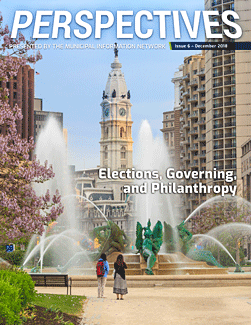I sat restlessly at the kitchen table taking the last gulp from my third cup of coffee wondering if I had made the right decision: The decision to put myself into the race for Deputy Mayor [of Innisfil, Ontario] in the upcoming municipal election.
I had given this serious consideration. I had had some weighty conversations with close family members and a number of very supportive friends. But the deed was now done.
Earlier in the day I had made the trek to the Municipal Offices and met with the Municipal Clerk’s staff to file my nomination papers, complete with the mandatory endorsements of support from fellow electors (mostly family, friends and neighbours). I did so with the full knowledge that this would entail a serious commitment, but it would be an honour to represent my community both locally and at the County for the next four years.
I wasn’t concerned with surrounding myself with a solid support network or having a good understanding of what local government is about. I have spent almost a quarter century working inside local government for two progressive municipalities in the GTA [Greater Toronto Area]. And I had no doubts about my supportive network of friends and family who were solidly behind me and ready to help in ways that I could not imagine.
What gave me pause for concern was that I was new to this community, and I was going to face an uphill climb having virtually no name recognition in a sport that thrives on headlines and airtime. I knew that despite a full slate of candidates (5) for the office of Deputy Mayor, it would take a great deal of work to overcome the odds of beating out an individual who had previously held the position.
It was a long shot, but I did my homework. I reached out to current and former members of council, local community groups, a variety of businesses and citizens. I spent a significant amount of time getting to understand the nexus of a wide range of issues.
What I realized was that despite the range of issues I heard about, there was a constituency clamoring to be heard and understood. Time and time again I heard from those who felt they were forgotten, ignored, and disenfranchised by a level of government that seems to care but once every four years.
Spending time to do the reading and research made me a better citizen, a more informed candidate and one who was not running as a one trick pony buoyed by a single issue hoping to capitalize on riding a single wave to electoral success. If I was going to be serious about representing the community, I wanted to represent all of the people. I needed to understand the concerns that make this community what it is.
I had decided early on that if I put my name forward it would be for the purpose of being the very best representative, advocate, and policy maker that I could be. I wanted to help my community and share my skills as a facilitator, change agent and community builder. I was committed and inspired to use my knowledge and expertise in a way that would advance various initiatives for the betterment of my community. After all, I had volunteered in the past to support those who were disadvantaged, those who were in need of compassion, temporary housing, or social and community supports.
Having sized up the competition I felt relatively confident that I would be able to stand my ground in any debate or with any challenges presented by electors who might take issue with any of my platform. So, I put forward my platform. It wasn’t about throwing mud at any of the candidates or the current council--it was about offering up solutions to problems that were identified by a wide constituency of the community. I felt that I had a solid campaign platform, a team of dedicated volunteers, and a desire to improve the community for the betterment of all.
I campaigned for the next three months: door-knocking daily, spending the evenings responding to campaign e-mails, returning phone calls, filling out special interest [organization’s] “municipal candidate surveys”, and attending what seemed to be an endless string of all-candidates community debates. I was delighted to see the campaign period draw to a close.
Looking back now, I realize that I met some pretty incredible and committed residents. Their passion for this community was never an issue, but their dogged determination at times seemed to get in the way of the true message they were trying to deliver.
I also met some folks who had some serious grievances that were not being addressed. I discovered that there is a concern that something would have to give before too long.
When the final tally was rendered (a day after the actual election day, due to a technical problem with the internet voting option) I was disappointed to find myself finishing 3rd out of the 5 seeking the office of Deputy Mayor.
Despite all of the door knocking, the mailouts, the debates and the social media efforts, it was not meant to be. Overcoming name recognition seemed to be insurmountable for my first attempt at elected office.
What was more disappointing was the poor turnout (32%) despite the much vaunted “internet and telephone” voting option that was supposed to help increase the voter engagement. There remains a big question as to why the majority of citizens can’t be bothered to exercise their democratic rights and vote in local elections.
I also learned that although social media as a vehicle is a good way to reach a broad audience, there are far too many trolls who use the medium to engage and misinform people for a variety of reasons (‘fake news’). As a means to an end it may not be all that appropriate when those participating aren’t open to some honest dialogue and debate. Cheap shots and uninformed opinions too often dominated the discourse on several sites.
If I had the opportunity to change some aspects of municipal elections, I would offer the following thoughts:
- Hold municipal elections in the spring (April-May timeline), so the new council members can get their feet under them before they are faced with the challenge of putting together the next year’s budget.
- Election technology should not be allowed to disenfranchise voters – when connectivity, and technology are an issue with large segments of the voting population, we should make accommodations that meet the needs of the residents.
- It is time to outlaw the blight and proliferation of election signage. Designate a limited number of locations where signs can be placed or outlaw then entirely. Sign pollution creates an eye-sore and is an environmental disaster.
- It may be time for federal, provincial and municipal elections to be coordinated by a single entity and a consistency in the eligibility rules for determining a permanent voters list.
I was asked right after the election if I would consider running again in four years? I’m not sure at this time. To be fair to myself and my family, I’ll assess the situation at that time and decide if another run is in the cards.
I will however, continue to advocate for more women in politics and will continue to closely follow our local political scene. Where appropriate I will certainly voice my concerns and participate in helping to advance issues that are critically important for the future of the community.
Angela Gravelle








